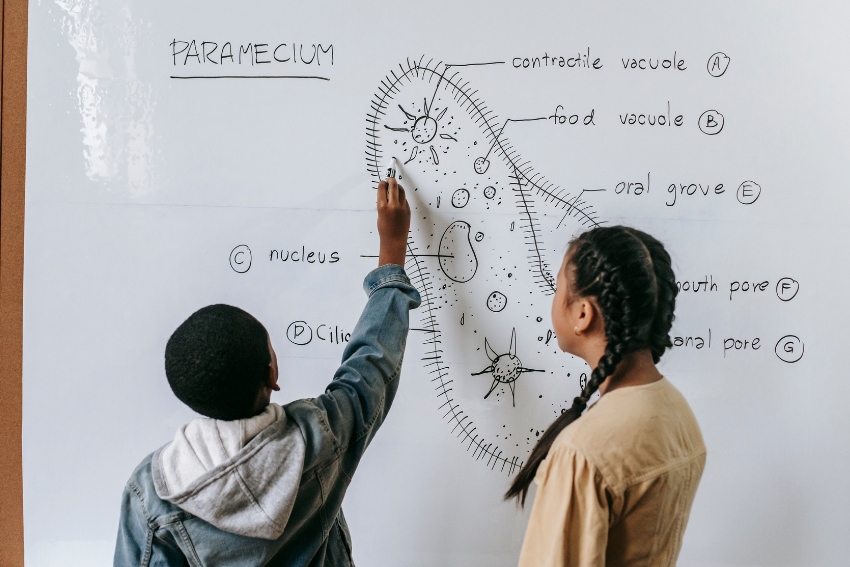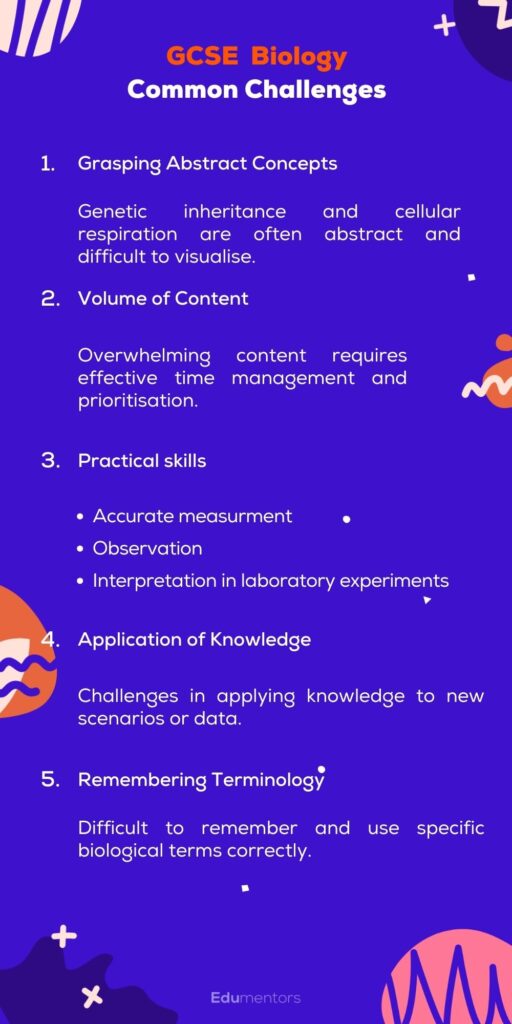GCSE Biology 2024 Guide – Everything you Need to Know
GCSE Biology is an exciting subject that explores the wonders of life, from tiny cells to complex ecosystems. Moreover, This course helps students understand essential biological processes and the world around them, fostering a curiosity for scientific discovery. Covering topics like genetics, evolution, and ecology, it equips learners with valuable skills for further education and future careers in science. Whether you’re aiming to ace your exams or simply eager to learn more about the living world, GCSE Biology offers a fascinating journey into the heart of life on Earth.
7 Key Topics in Biology

GCSE Biology encompasses a variety of key topics, each offering a unique perspective on the living world. While the specific content may vary slightly between different examination boards, the core topics generally include:
- Cell Biology
- Organisation
- Infection and Response
- Bioenergetics
- Homeostasis and Response
- Inheritance, Variation, and Evolution
1. Cell Biology
To start with, this foundational topic explores the building blocks of life cells. Specifically, it covers the structure and function of plant, animal, and specialised cells, cell division processes (mitosis and meiosis), as well as the molecular mechanisms of transport across cell membranes.
Cell Structure
To begin with, understanding cell structure is fundamental in biology. Broadly speaking, cells are classified into prokaryotic (without a nucleus, like bacteria) and eukaryotic (with a nucleus, found in plants and animals). Moreover, key organelles include the nucleus, which controls cell activities, mitochondria, responsible for energy production, and chloroplasts, which are involved in photosynthesis in plants.
Cell Division
Initially, cell division occurs through mitosis, producing two genetically identical daughter cells, which are essential for growth and repair. Furthermore, stem cells, capable of differentiating into various cell types, hold significant potential in medical research.
Transport in Cells
- Diffusion: Movement of particles from an area of high concentration to low concentration.
- Osmosis: Diffusion of water across a selectively permeable membrane.
- Active Transport: Movement of substances against their concentration gradient, requiring energy.
2. Organisation
This segment begins by delving into the organisation of organisms, including the human digestive and circulatory systems. Moreover, it examines plant transport systems in addition to the structure and function of enzymes.
Digestive System
The human digestive system breaks down food into nutrients absorbed into the bloodstream. Enzymes, such as amylase (breaks down starch), play a crucial role in this process.
Circulatory System
Firstly, the heart pumps blood throughout the body via arteries, veins, and capillaries. As a result, this system delivers oxygen and nutrients to cells while simultaneously removing waste products.
Plant Organisation
Plants consist of various tissues, including xylem (water transport) and phloem (nutrient transport). Transpiration and translocation are vital processes for plant survival and growth.
3. Infection and Response
The Infection and Response topic in GCSE Biology delves into how our bodies defend against diseases and how pathogens such as bacteria, viruses, and fungi can cause infections. Therefore, Understanding the body’s immune response is crucial, as it highlights how vaccines, medicines, and antibiotics work to protect us.
Firstly, this section covers the different ways our immune system fights off invaders, including the importance of immunisation and the role of scientific research in developing new treatments. By exploring this topic, students can appreciate the ongoing battle between health and disease.
Communicable Diseases
Pathogens such as viruses, bacteria, fungi, and protists cause diseases. Understanding their transmission and effects is crucial for prevention and treatment.
Human Defence Systems
The immune system primarily fights infections through white blood cells and antibodies. Additionally, vaccination helps build immunity by exposing the body to a weakened form of the pathogen.
Antibiotics and Resistance
Antibiotics kill bacteria, but misuse can lead to antibiotic-resistant strains, posing a significant public health challenge.
4. Bioenergetics
Bioenergetics is the study of how energy flows through living organisms. It focuses on understanding how cells convert nutrients into energy, which is essential for survival and growth. Key processes like photosynthesis and cellular respiration are central to this topic, illustrating how plants capture sunlight and how animals release energy from food.
By exploring these processes, bioenergetics reveals the intricate mechanisms that power life, thereby offering insights into everything from plant growth to human metabolism. Thus, understanding bioenergetics is crucial for grasping how life sustains itself at the cellular level.
Photosynthesis
To begin with, photosynthesis converts light energy into chemical energy in plants. The process can be summarised by the equation: 6CO2 + 6H2O → C6H12O6 + 6O2. Moreover, factors affecting photosynthesis include light intensity, CO2 concentration, and temperature.
Respiration
- Aerobic Respiration: Glucose + Oxygen → Carbon Dioxide + Water + Energy (ATP).
- Anaerobic Respiration: In the absence of oxygen, this produces lactic acid (in animals) or ethanol and CO2 (in plants and yeast).
5. Homeostasis and Response
This section specifically examines how organisms maintain internal balance through homeostasis, including control of blood glucose levels and body temperature. Additionally, it explores how organisms respond to their environments. Learn more about homeostasis and response.
Nervous System
The nervous system, which consists of the brain, spinal cord, and nerves, transmits electrical impulses to coordinate body functions. As a result, it plays a crucial role in maintaining the body’s overall functionality.
Hormonal Coordination
The endocrine system uses hormones to regulate processes such as growth, metabolism, and reproduction. Examples include insulin (regulates blood sugar) and adrenaline (prepares the body for ‘fight or flight’).
Homeostasis
Homeostasis maintains a stable internal environment. Key aspects include:
- Temperature Regulation: Ensures optimal enzyme function.
- Osmoregulation: Balances water and salt levels.
- Blood Glucose Regulation: Controlled by insulin and glucagon.
6. Inheritance, Variation, and Evolution
This topic explores the genetic principles behind inheritance, variation, and the process of evolution.
Inheritance:
- Process by which genetic information is passed from parents to offspring.
- Genes located on chromosomes determine traits such as eye colour and hair type.
- Each individual inherits a mix of genes from both parents, leading to unique genetic makeup.
Variation:
- Differences in characteristics among individuals of the same species.
- Caused by genetic factors (different gene combinations) and environmental factors (climate, diet).
- Essential for species survival as it provides material for evolution.
Evolution:
- Gradual change in inherited traits of populations over generations.
- Driven by natural selection, where individuals with favourable traits are more likely to survive and reproduce.
- Explains how species adapt and evolve over time, as proposed by Charles Darwin.
7. Ecology
The final major topic primarily focuses on studying the interactions of organisms with their environment, including the principles of ecosystems, biodiversity, and human influences on the environment. In doing so, it highlights the interconnectedness of living systems and the impact of human activity.
Each of these topics not only provides a robust foundation in biology but also invites students to appreciate the complexity and interconnectedness of life, fostering an enduring interest in the natural world.
Ecosystems:
- Definition: A community of living organisms and their physical environment interacting as a system.
- Components: Biotic (living organisms) and abiotic (non-living factors like sunlight, water, and soil).
Biomes:
- Definition: Large geographic biotic units characterised by their climate, flora, and fauna. Examples include forests, deserts, and tundras.
Energy Flow:
- Trophic Levels: The hierarchy of energy transfer in an ecosystem, from producers (plants) to primary consumers (herbivores) to secondary consumers (carnivores) and decomposers.
- Food Chains and Webs: Diagrams showing the flow of energy and nutrients through an ecosystem.
Nutrient Cycles:
- Cycling: The movement of essential nutrients (e.g., carbon, nitrogen, phosphorus) through ecosystems via processes like photosynthesis, respiration, and decomposition.
Population Ecology:
- Population Dynamics: Study of how populations of species change over time and space, influenced by factors such as birth rates, death rates, immigration, and emigration.
Community Ecology:
- Interactions: Examines relationships between species, including predation, competition, mutualism, and parasitism.
Conservation Ecology:
- Focus: Strategies to preserve biodiversity, protect endangered species, and restore ecosystems affected by human activity.
Human Impact:
- Issues: Habitat destruction, pollution, climate change, and overexploitation affecting ecosystems and biodiversity.
Key Areas of GCSE Biology by Exam Boards
When preparing for GCSE Biology, understanding the core areas highlighted by different exam boards is crucial for effective Biology revision. Each board may emphasise slightly different aspects, but all cover fundamental topics essential for your success. In this section, we’ll break down the key areas of GCSE Biology as outlined by major exam boards, helping you focus your study efforts on the most critical content.
Pearson Edexcel
Pearson Edexcel’s GCSE Biology is structured to cover various key biological concepts and processes. Here are the main areas:
- Key Concepts in Biology
- Cells and Control
- Genetics
- Natural Selection and Genetic Modification
- Health, Disease, and the Development of Medicines
- Plant Structures and Their Functions
- Animal Coordination, Control, and Homeostasis
- Exchange and Transport in Animals
- Ecosystems and Material Cycles
AQA
AQA’s GCSE Biology curriculum focuses on a broad range of biological topics designed to provide a thorough understanding of biological principles. The key areas include:
- Cell Biology
- Organisation
- Infection and Response
- Bioenergetics
- Homeostasis and Response
- Inheritance, Variation, and Evolution
- Ecology
- Key Ideas
OCR
OCR’s GCSE Biology curriculum is designed to cover a comprehensive range of biological topics, providing a solid foundation in biology. The key areas are:
- Cell Level Systems
- Scaling Up
- Organism Level Systems
- Community Level Systems
- Genes, Inheritance, and Selection
- Global Challenges
Summary
- Pearson Edexcel focuses on fundamental biology concepts, genetics, plant and animal physiology, and ecosystems.
- AQA covers cell biology, bioenergetics, genetics, evolution, and ecological principles.
- OCR includes cellular systems, transport mechanisms, organism and community level systems, and global biological challenges.
Common Challenges in GCSE Biology
Admittedly, the path to mastering Biology can sometimes be strewn with challenges. However, understanding these common hurdles can provide a roadmap to overcome them.
1. Grasping Abstract Concepts
To begin with, concepts in biology can often be abstract and complex, particularly genetic inheritance or cellular respiration, thus making them difficult to visualise and understand.
2. Volume of Content
Initially, the sheer volume of content to cover in GCSE Biology can seem overwhelming for many students, thereby resulting in difficulty managing time and prioritising topics for revision.
3. Practical Skills
While theoretical knowledge is a significant part of the course, students may struggle with the practical skills required, such as accurate measurement, observation, and interpretation in laboratory experiments.
4. Application of Knowledge
Biology, on the whole, is not just about memorising facts. Instead, exam boards frequently test the ability to apply knowledge to new scenarios or data, a skill that many students find challenging.
5. Remembering Terminology
Firstly, the extensive use of specific biological terminology can be daunting. As a result, students often have trouble remembering and appropriately using these terms. However, by recognising these common challenges, students can better equip themselves with strategies to tackle them, thereby ensuring a smoother and more effective learning experience.

GCSE Biology Exam Questions
To help you get a real feel for the examination, here are five sample GCSE Biology questions. Importantly, each question is accompanied by its answer, an explanation, and some common mistakes students often make.
1. What is the main purpose of mitosis in multicellular organisms?
Answer: The main purpose of mitosis in multicellular organisms is for growth and to replace worn-out cells.
Explanation: To begin with, a form of cell division called mitosis produces two daughter cells that are genetically identical to the parent cell. This process is essential because it is necessary for multicellular organisms to expand, by adding more cells to increase size, and to repair, by replacing injured, dead, or worn-out cells.
Common Mistake: Students often confuse mitosis with meiosis, which is involved in sexual reproduction and results in four genetically different daughter cells.
2. Explain how the structure of a villus aids absorption in the small intestine?
Answer: Villi increase the surface area for absorption, have a network of capillaries to absorb nutrients, and a lacteal to absorb fatty acids and glycerol.
Explanation: The small intestine is lined with tiny, finger-like extensions called villi. The intestine’s internal surface area is significantly increased by their vast quantity and shape, which improves nutrient absorption. Via a rich network of blood capillaries, each villus may swiftly absorb and transfer nutrients that have been digested. Furthermore, each villus has a lacteal, a portion of the lymphatic system that is specifically designed to absorb fats that have been digested.
Common Mistake: Students often forget to mention the role of the lacteal or may not fully explain how the villi increase the surface area.
3. Describe the process of osmosis?
Answer: To begin with, osmosis is the movement of water molecules from an area of higher water concentration (or lower solute concentration) to an area of lower water concentration (or higher solute concentration), across a semi-permeable membrane.
Explanation: Osmosis is an example of passive transport, which means energy is not needed for it. It occurs spontaneously when a semi-permeable membrane experiences a change in solute concentration. In an attempt to balance the concentration on both sides of the membrane, water molecules move.
Common Mistake: A common misconception is that osmosis involves the movement of solute particles rather than water molecules. Also, students sometimes forget to mention the semi-permeable membrane.
4. Question: How does the human body maintain blood glucose levels?
Answer: The human body maintains blood glucose levels primarily through the hormones insulin and glucagon, which are released by the pancreas.
Explanation: The pancreas secretes insulin in response to elevated blood glucose levels, such as those following a meal, which facilitates glucose uptake by body cells and subsequently lowers blood glucose levels. On the other hand, when blood glucose levels fall, the liver releases stored glucose into the bloodstream due to the pancreas’ secretion of glucagon.
Common Mistake: Students often confuse the roles of insulin and glucagon or omit the role of the pancreas in this process.
5. Question: How does natural selection lead to evolution?
Answer: Natural selection leads to evolution by favouring individuals with advantageous traits, allowing them to survive, reproduce, and pass these traits to their offspring.
Explanation: To begin with, there is variety in qualities within any population. Importantly, some of these characteristics give their bearers an advantage in the current environment, increasing their chances of surviving and procreating. Consequently, as these advantageous characteristics proliferate over successive generations, the genetic composition of the population shifts—a process known as evolution.
Common Mistake: Some students mistakenly believe that individual organisms evolve during their lifetime or fail to mention the role of the environment in natural selection.

Sample GCSE Biology Questions (Difficult)
Let’s take it up a notch with five more challenging GCSE Biology questions. As before, the correct answers, explanations, and common pitfalls are provided.
1. Question: How does DNA replication ensure that cells can divide to grow or repair tissue?
Answer: DNA replication ensures that each new cell has the full set of DNA (genes) necessary to produce the proteins required for the cell to function.
Explanation: A cell duplicates all of its DNA before it divides, giving each daughter cell that results an identical copy of the original material. This is important because all of the instructions needed for the cell to produce the proteins it needs to operate are encoded in its DNA. As a result, every new cell in a tissue that is expanding or healing has all the instructions necessary for it to contribute to the tissue’s function.
Common Mistake: Students often overlook the role of DNA as a template for protein synthesis, focusing only on its replication aspect.
2. Question: How does a mutation in a gene lead to a change in the protein that the gene codes for?
Answer: A mutation in a gene changes the sequence of DNA bases, which can alter the sequence of amino acids in the protein, potentially changing its shape and function.
Explanation: A gene is a segment of DNA that codes for a specific protein. This code is a sequence of DNA bases. If a mutation changes this sequence, the mRNA produced during transcription will have a different sequence of bases. During translation, this can lead to a different sequence of amino acids being assembled to make the protein. The sequence of amino acids determines the protein’s shape and function, so a change in this sequence can alter how the protein works.
Common Mistake: For example, students often fail to mention the stages of transcription and translation, and furthermore, they don’t fully understand the impact of an altered amino acid sequence on the protein’s function.
3. Question: Why do animals need to maintain a stable internal environment?
Answer: Animals need to maintain a stable internal environment, or homeostasis, to ensure optimal conditions for enzyme-controlled reactions and maintain cell function.
Explanation: To begin with, enzymes, which catalyse most biological reactions, function best within specific temperature and pH ranges. However, deviations from these optimum conditions can impair enzyme function, slowing down vital metabolic reactions, or even causing cellular damage. Therefore, by maintaining homeostasis, animals ensure that their cells function properly and vital biological processes occur efficiently.
Common Mistake: Students often omit the role of enzymes and the impact of environmental conditions on their function when discussing the importance of homeostasis.
4. Question: Explain how antibiotic resistance can develop in bacteria.
Answer: Antibiotic resistance can develop in bacteria due to genetic mutations that confer resistance. Bacteria with this resistance survive when exposed to the antibiotic, reproduce, and pass on the resistance to their offspring.
Explanation: Initially, genetic variation in bacteria, often through mutations, can result in some bacteria being resistant to a specific antibiotic. When this occurs, using the antibiotic kills the non-resistant bacteria, while the resistant bacteria survive. Consequently, these surviving bacteria reproduce, passing on the resistance trait. Over time, the population of bacteria evolves to become largely resistant to the antibiotic.
Common Mistake: For instance, students often fail to mention the role of natural selection in the development of antibiotic resistance and instead assume that bacteria can develop resistance in response to being exposed to an antibiotic.
5. Question: How does the greenhouse effect contribute to global warming?
Answer: The greenhouse effect primarily contributes to global warming by trapping heat in the Earth’s atmosphere. Consequently, increased levels of greenhouse gases like carbon dioxide result in more heat being retained, thereby raising the Earth’s average temperature.
Explanation: Greenhouse gases in the Earth’s atmosphere, such as carbon dioxide, methane, and water vapour, trap heat from the sun. This is the greenhouse effect, and it’s necessary for life on Earth as it keeps the planet warm. However, human activities, such as burning fossil fuels and deforestation, have increased the concentration of these gases in the atmosphere. This enhances the greenhouse effect, trapping more heat and leading to a rise in the Earth’s average temperature, a phenomenon known as global warming.
Common Mistake: Students often confuse the greenhouse effect with global warming or fail to explain the impact of human activities on the greenhouse gas concentrations.

Understanding the GCSE Biology Marking Scheme
Grasping the GCSE Biology marking scheme is crucial for mastering the exam. It not only helps you to focus your revision on the most important areas but also enables you to maximise your marks by aligning your answers with the examiners’ expectations. In this section, we’ll break down how marks are awarded, what examiners look for, and how you can tailor your answers to meet these criteria effectively.
1. Knowledge and Understanding
To begin with, examiners allocate marks for demonstrating a clear understanding of the biological concepts, facts, and principles stated in the specification. Therefore, be sure to accurately recall key information and present it in a well-structured, coherent manner.
2. Application
Applying knowledge to unfamiliar contexts is an essential skill in biology. Marks are given for using what you’ve learned to explain new scenarios, solve problems, or interpret data.
3. Analysis and Evaluation
Firstly, the ability to analyse and interpret data, draw conclusions from experimental results, and evaluate methods and claims is a critical aspect of the marking scheme. Moreover, clear, logical reasoning backed up with evidence is the key here.
4. Practical Skills and Techniques
Given the significant practical component in GCSE Biology, the ability to design experiments, make precise measurements, and handle equipment safely and effectively is evaluated. Therefore, mastering these skills is crucial for success in the course. Furthermore, students are assessed on their capacity to apply these skills in a laboratory setting.
5. Mathematical Skills
The GCSE Biology specification requires students to demonstrate competence in specific mathematical skills, such as calculating rates, using percentages and ratios, plotting and interpreting graphs, and carrying out statistical tests.
6. Quality of Written Communication
Marks are also allocated for clarity of expression, the logical organisation of ideas, and the appropriate use of biological terminology. Spelling, punctuation, and grammar also count.
While each exam board may have a slightly different marking scheme, understanding these broad areas of focus will go a long way in improving your exam performance.
Grading Scheme
Recently, the GCSE grading system transitioned from letters (A* to G) to numbers (9 to 1), with 9 being the highest. As a result, this shift allows for greater distinction among top performers.
In particular, GCSE Biology grades are awarded based on performance across exams, practical assessments, and coursework. Specifically, achieving high marks in these areas can lead to grades 7, 8, or 9, which are comparable to the previous A and A* grades, with 9 denoting exceptional achievement. Conversely, grades 4 to 6 indicate a standard pass, while a score below 4 is a fail. Moreover, a ‘strong pass’—grade 5 or higher—is often required for A-level courses.
Therefore, understanding this grading system is crucial for setting realistic study objectives and monitoring progress, aiming for the highest possible outcomes.
Assessment Structure
The assessment for GCSE Biology is designed to test a wide range of skills and knowledge through two main written exams. Each exam is 1 hour and 45 minutes long and contributes 50% to the final grade. They include various question types such as multiple-choice, short answer, and extended response questions.
- Paper 1: Covers Cell Biology, Organisation, Infection and Response, and Bioenergetics.
- Paper 2: Covers Homeostasis and Response, Inheritance, Variation and Evolution, and Ecology.
Preparing for Success
In order to excel in GCSE Biology, students should focus on understanding core concepts and applying their knowledge to new situations. Moreover, practical experiments and real-world examples play a vital role in solidifying this understanding. Using revision guides, past papers, and engaging in regular study sessions can significantly enhance learning outcomes.
How to Revise for GCSE Biology?
Revising for GCSE Biology can be challenging due to the breadth of topics. However, a strategic approach makes it manageable. To begin with, focus on understanding core concepts and create a comprehensive revision schedule. Additionally, use various resources and active learning methods to reinforce knowledge.
Moreover, practising regularly helps familiarise you with the exam format. For students taking combined science or all three sciences, it’s worth considering how biology connects with GCSE chemistry since many biological processes rely on chemical reactions. To get started, here are some practical tips. First, choosing the right resources can make your revision more effective and enjoyable. Consequently, here are some tips that have proven helpful for many students:
- 1. GCSE Biology Textbooks
- 2. Past Papers
- 3. Revision Guides
- 4. Online Revision Websites
- 5. Flashcards
- 6. Educational YouTube Channels
- 7. Study Groups
- 8. Private Tuition
We also have blogs about revision. Check out them to find best revision apps and techniques for GCSE Biology. Here they are:
- How to Revise Biology? – Here is Top 10 Tips
- The Top 7 Revision Methods, Ranked 2024
- Top 10 Websites for GCSE Revision
- Best Revision Apps for GCSE and A Level
Conclusion
Indeed, the path to Biology success is filled with wonder, curiosity, and an appreciation for the intricate workings of life itself. Nevertheless, it can also be challenging. Therefore, to navigate this journey, guidance from those who have tread the path successfully can make a profound difference.
At Edumentors, they firmly believe in the power of shared knowledge and experience. We offer educational services from dedicated GCSE Biology tutors, who are students from top UK universities, are not only well-versed in the subject matter, but they have also mastered the art of the GCSE examinations.
They understand what it’s like to be in your shoes and are uniquely equipped to guide you. By doing so, they build your confidence, hone your skills, and help you unlock your full potential.








